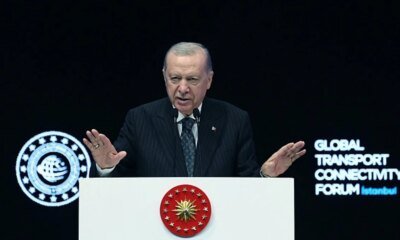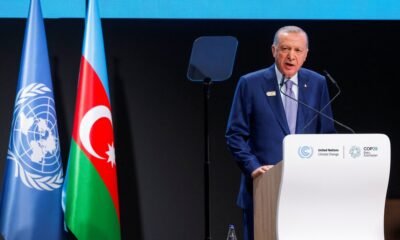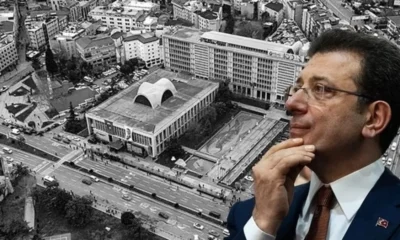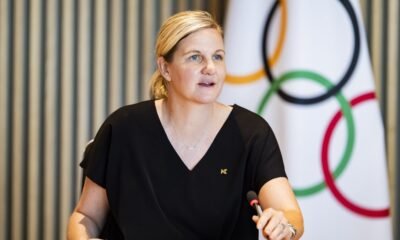Economy
China partially lifts ban on seafood imports from Japan
Chinese authorities have lifted a ban on seafood imports from most regions of Japan, partially mending a yearslong dispute over Tokyo’s handling of nuclear wastewater, mainly from the Fukushima plant.
China and Japan are key trading partners, but increased friction over territorial rivalries and military spending has frayed ties in recent years.
Japan’s brutal occupation of parts of China before and during World War II remains a sore point, with Beijing accusing Tokyo of failing to atone for its past.
Japan began gradually releasing treated wastewater from the stricken Fukushima nuclear plant into the Pacific Ocean in 2023.
The move was backed by the International Atomic Energy Agency (IAEA), and the plant operator TEPCO says all radioactive elements have been filtered out except for tritium, levels of which are within safe limits.
But it drew sharp criticism from Beijing, which banned imports of Japanese seafood as a result. Russia later followed suit.
Samples from long-term monitoring of nuclear-contaminated water from Fukushima had “not shown abnormalities,” China’s General Administration of Customs said in a statement Sunday.
As a result, China “decided to conditionally resume” seafood imports from Japan, with the exception of imports from 10 of the country’s 47 prefectures, including Fukushima and Tokyo, which remain banned.
The Japanese government received the decision “positively,” Kazuhiko Aoki, deputy chief cabinet secretary, told reporters in Tokyo.
But Japan “will strongly demand the Chinese side lift remaining import regulations on seafood from 10 prefectures,” he added.
Japanese Agriculture Minister Shinjiro Koizumi also called China’s move “a major milestone.”
In 2011, a huge earthquake triggered a deadly tsunami that swamped the Fukushima nuclear facility and pushed three of its six reactors into meltdown.
China vociferously opposed the release of the treated wastewater, casting it as environmentally irresponsible. But in September last year, it said it would “gradually resume” importing the seafood.
Production companies that had suspended trade must reapply for registration in China and would be “strictly” supervised, Beijing’s customs administration said Sunday.
Economy
ING to cut 230 posts as it says it has ‘too many’ managing directors
Dutch banking giant ING said on Monday it planned job cuts focused on senior staff, saying there are just too many of them, several media reports, citing the bank, said.
The lender plans to eliminate 230 roles across its wholesale banking division, Bloomberg reported, referring to a statement on Monday. The cuts “will be focused on Directors and Managing Directors in commercial, front office roles,” as the lender has “too many senior roles,” it said.
Shares in ING were 2.1% lower at 11:15 a.m. in Amsterdam. The stock is up about 23% this year to date, compared with about 30% for the wider European banking sector.
The bank said the cuts were prompted by a combination of “market circumstances” and the goal of “re-balancing” staff. The cuts will be split proportionally across its locations, it said.
Economy
Canada scraps digital services tax to advance US trade talks
Canada scrapped its digital services tax targeting U.S. technology firms late on Sunday, only hours before it was due to take effect, in what appeared to be a bid to advance stalled trade negotiations with its southern neighbor.
Canadian Prime Minister Mark Carney and U.S. President Donald Trump will resume trade negotiations in order to agree on a deal by July 21, Canada’s finance ministry said in a statement.
Trump abruptly called off trade talks on Friday over the tax targeting U.S. technology firms, saying that it was a “blatant attack.”
He reiterated his comments on Sunday, pledging to set a new tariff rate on Canadian goods within the next week, which threatened to push U.S.-Canada relations back into chaos after a period of relative calm.
The breakdown in trade talks comes after the two leaders met at the G-7 in mid-June and Carney said they had agreed to wrap up a new economic agreement within 30 days.
Canada’s planned digital tax was 3% of the digital services revenue a firm takes in from Canadian users above $20 million in a calendar year, and payments were to be retroactive to 2022.
It would have impacted U.S. technology firms, including Amazon, Meta, Alphabet’s Google and Apple, among others.
Monday collection will be halted, Canada’s finance ministry statement said, and Finance Minister Francois-Philippe Champagne will bring forward legislation to rescind the Digital Services Tax Act.
“The DST was announced in 2020 to address the fact that many large technology companies operating in Canada may not otherwise pay tax on revenues generated from Canadians,” the statement said. “Canada’s preference has always been a multilateral agreement related to digital services taxation.”
Stock index futures rose after the news that the digital tax will be rescinded, and the bullish sentiment spilled over into Asian markets.
Canada is the second-largest U.S. trading partner after Mexico, and the largest buyer of U.S exports. It bought $349.4 billion of U.S. goods last year and exported $412.7 billion to the U.S., according to U.S. Census Bureau data.
The Biden administration had requested trade dispute settlement consultations over the tax in 2024, saying it was inconsistent with Canada’s North American trade deal obligations.
Canada had escaped Trump’s broad tariffs imposed in April but faces 50% duties on steel and aluminum.
Economy
Chinese factory activity improves in June, but still in contraction
Chinese factory activity improved slightly in June after U.S. President Donald Trump agreed to delay imposing higher tariffs on imports from China for 90 days, but overall activity was still stuck in contraction, according to a survey released Monday.
The purchasing managers index (PMI), which reflects new orders and other measures, rose to 49.7 from 49.5 in May, the National Bureau of Statistics reported. That’s on a scale of 0 to 100, where 50 and above shows expansion.
Other reports showed similar trends in Japan and Korea.
Trump has said he’s not planning to extend the 90-day pause on tariffs on most nations beyond July 9. The delay for imposing much higher tariffs on China, agreed to in early May, expires about a month later.
The hiatus for tariffs brought a revival of manufacturing activity as companies and individuals rushed to take advantage of lower import duties. But that mainly helped large manufacturers, with small and mid-size companies’ output still contracting. Hiring also fell.
New export orders and exports also remained below the 50-level that marks expansion.
In Japan, manufacturing output edged 0.5% higher in May, well below analysts’ estimates for a 3.5% increase.
“The subdued rise in industrial production in May means that firms were not benefitting from sky-high U.S. tariffs on Chinese imports, and their production forecasts point to continued weakness,” Marcel Thieliant of Capital Economics said in a report.
South Korea’s government reported that its “all industry” measure of output fell 2.9% from a year earlier in May, with production of computer chips falling 2%. Production of vehicles fell 2.3% year-on-year, after falling 4.1% in April.
In an interview with Fox News Channel’s “Sunday Morning Futures,” Trump said he’s not planning to extend a 90-day pause on tariffs on most nations beyond July 9. The delay for imposing much higher tariffs on China, agreed to in early May, expires about a month later.
Trump said his administration will notify countries that the trade penalties will take effect unless there are deals with the U.S. He had played down the deadline at a White House news conference Friday by noting how difficult it would be to work out separate deals with each nation. The administration had set a goal of reaching 90 trade deals in 90 days.
Despite a recent trade deal with Beijing over rare earth exports from China, establishing a fairer relationship will require significant tariffs.
Details of the latest agreement to de-escalate trade tensions are scarce, and significant issues between the world’s two biggest economies remain unresolved.
“I think getting along well with China is a very good thing,” Trump said. “China’s going to be paying a lot of tariffs, but we have a big (trade) deficit, they understand that.”
Economy
Türkiye advances toward exit from FX-protected scheme
The planned exit from the FX-protected scheme, which Turkish authorities began to scale back in 2023 along with the shift to more conventional economic policies, appears to be on track, recent data shows.
The latest banking data, shared on Thursday, revealed that the stock of FX-protected accounts, or the so-called KKM, has fallen further below TL 600 billion ($15 billion) from TL 3.4 trillion in August 2023.
The KKM balance decreased by nearly TL 7 billion last week to TL 559.3 billion, according to the data from the Banking Regulation and Supervision Agency (BDDK). Thus, the KKM size accounted for 2.46% of total deposits, the data revealed.
Expectations are that this share will drop further and that the accounts will be fully phased out by the end of the year.
This decline is also seen as a sign of renewed confidence in the Turkish lira. According to experts, this process also aligns with the goal of curbing inflation.
Annual inflation in Türkiye has eased to as low as 35.4% in May, according to the official data. The inflation data for June is due to be announced this Thursday.
Under the KKM scheme, adopted in late 2021 to help reverse dollarization and counter a steep fall in lira, the Turkish central bank has been protecting deposits by covering depreciation costs.
But authorities have been seeking to phase it out gradually and transition deposits into regular lira accounts, in part by dissuading companies and individuals from renewing the KKM accounts.
Treasury and Finance Minister Mehmet Şimşek noted recently that exiting from the FX-protected scheme was “an important goal,” mentioning that they will “probably end this practice soon.”
The Central Bank of the Republic of Türkiye (CBRT), in its yearly road map for 2025, said it aimed to end the scheme, which has heavily weighed on the budget, this year.
“FX-protected deposits were introduced as a macroprudential measure. The deposit balance reached its peak in August 2022, but has been declining since the second half of 2023. There has been a strong downward trend in this balance for nearly two years,” Harun Türker, a faculty member at Ankara Medipol University, told public broadcaster TRT Haber.
“The decrease in KKM actually reflects trust in the Turkish lira and confidence in the new combination of monetary policy implemented during the disinflation process. As confidence in the Turkish lira increases, we observe a corresponding decrease in FX-protected deposit balances,” he added, according to remarks published on Sunday.
“At the beginning of the year, the central bank said that this could be concluded within the year. With the acceleration of the process, we may witness the full elimination of the FX-protected deposit balance,” he stated.
Economy
Turkish exporters could see benefit in stronger euro: Expert
Turkish exporters see the rise in the euro/U.S. dollar exchange rate as a potentially beneficial development, an expert opined recently, while the uncertainties over the independence of the Federal Reserve (Fed) continued to fuel concerns.
U.S. President Donald Trump is reportedly considering selecting a new name to chair the Fed in September or October. The Fed’s likelihood of making three rate cuts by the end of the year increased, causing the euro/U.S. dollar exchange rate to rise to 1.1745 this week, a nearly four-year high.
The decline in the U.S. dollar showed that investors responded to Trump’s decisions by selling their dollar assets, putting downward pressure on the U.S. Dollar Index, which fell to 97.076 on Thursday, its lowest since March 2022.
Tonguç Erbaş, general manager of Türkiye-based financial services firm Ahlatci Portföy, told Anadolu Agency (AA) on Friday that the rise in the exchange rate has been positive for Turkish exporters, and the European Central Bank (ECB)’s tight monetary stance to bring down the bloc’s inflation to 2% also contributed to the rise.
Erbaş stated that the ECB is gradually easing its policy to bring stability to the EU economy, while concerns over tariffs are largely limited, boosting market confidence. Meanwhile, the Fed remains cautious amid debates that Trump could likely install a “shadow chair” to the Fed.
“The rise in the euro/U.S. dollar exchange may have been positive for Turkish exporters because half of Türkiye’s exports go to Europe, but most of our imports are dollar-based,” he said.
“The rise in the exchange rate is allowing euro-based revenue to increase when converted to Turkish lira,” he added.
Erbaş noted that the Turkish industrial sector in particular could benefit from the exchange rate, but the exchange rate risk on the import side needs to be monitored closely.
Türkiye’s exports totaled $110.9 billion in January-May this year, 39% of which were to the EU, up 7.5% versus the same period last year, according to the data from Turkish Exporters’ Assembly (TIM).
Economy
Erdoğan unveils new credit packages to boost agriculture, livestock sectors
President Recep Tayyip Erdoğan shared on Saturday details of the new packages aimed at supporting farmers and producers in the country in different areas, while also recalling substantial financing provided so far.
Delivering a speech at Ziraat Bank’s “4th Agricultural Ecosystem Gathering” in Istanbul, Erdoğan said that the agricultural loans provided by the lender have exceeded TL 700 billion ($17.54 billion). He also expressed that the bank, known for its tradition of supporting agriculture, accounts for 71% of all credits in the sector.
Also stating that Ziraat Bank has prepared a successful credit package that suits the needs of the sector and expectations, the president went on to provide the key details regarding the new package.
“With ‘Işim Ziraat Kredisi’ we provide loans to our farmers in many areas at attractive opportunities,” he said.
“We are supporting our producers who want to set up greenhouses to grow vegetables and fruits with a new credit package,” he added.
“In this context, for financing greenhouse investments under 10 decares, we are offering a credit opportunity of up to TL 10 million with a maturity of up to 10 years and a one-year principal payment-free period,” he further explained.
The president also mentioned that while 20% of the investment amount is required as equity, he said that this ratio will be 10% in the case of young and female farmers.
“We are currently providing investment credit of up to TL 5 million with a maturity of up to seven years and a one-year principal payment-free period for the purchase of animals for the capacity increase of enterprises engaged in cattle and dairy farming without seeking equity,” he also said.
“Of course, we do not neglect our small cattle producers. We are paving the way for our small cattle producers who want to expand their scale, increase their animal stock and use their idle capacities for production,” said Erdoğan.
In line with this, he further suggested they were increasing the limit of small cattle loans under the project dubbed “I Have Many Reasons to Live in My Village,” which is carried out in cooperation with the Agriculture Ministry and Ziraat Bank, from TL 600,000 to TL 1.2 million.
“I hope that the credit opportunities will be beneficial and auspicious for our farmers,” he added.
Furthermore, the president reiterated that farmers who suffered damage from frost will be supported, while also noting that the effects of the climate crisis are being felt more. Erdoğan noted that they determined their water, agriculture and livestock policies with great seriousness, guided by this bitter truth.
Vegetable and fruit producers in many provinces in Türkiye were impacted by harsh frost earlier this year. The frost affected the production of key crops, including apples, apricots, grapes and walnuts, among others.
“We have recently implemented some revolutionary regulations. We have started production planning. We are deciding which product will be produced where and in what quantities,” he maintained.
Soil mapping, agricultural census
“Regarding soil survey and national soil mapping, we have provided $143.5 million of financing from the World Bank for 28 million hectares of agricultural and pasture land; work has been completed in 2.5 million hectares, and work continues in 6 million hectares,” he informed.
“We will update all data from land size to product pattern with the agricultural census we will start on July 1. I call on all our farmers to support the work to be carried out with the coordination of the ministry and TurkStat,” he added, referring to the Turkish Statistical Institute (TurkStat).
At the same time, he also called on farmers to obtain agricultural insurance.
Also mentioning the amounts of financing provided in the past, Erdoğan said: “Last year, we provided grants totaling TL 755 million to 71,000 people in 15 provinces. This year, we have allocated a budget of TL1.3 billion for our projects.”
“In other words, we, as the state, are and will continue to support those who work, produce, export, invest and generate jobs with all our means,” he vowed.
-

 Daily Agenda3 days ago
Daily Agenda3 days ago32 arrests in parsley doner operation connected to FETÖ
-

 Daily Agenda3 days ago
Daily Agenda3 days agoPresident Erdoğan: The importance of new transport corridors is obvious
-

 Sports3 days ago
Sports3 days agoProtester charged after disrupting Super Bowl with ‘Free Gaza’ flag
-

 Daily Agenda2 days ago
Daily Agenda2 days agoCrypos were deciphering – Breaking News
-

 Politics3 days ago
Politics3 days agoTürkiye, Australia battle to host 2026 UN climate talks
-

 Daily Agenda2 days ago
Daily Agenda2 days agoMinister Ali Yerlikaya explained! Operation for Cyber Crimes in 48 provinces: 284 suspects were caught in 1 week
-

 Daily Agenda2 days ago
Daily Agenda2 days ago36 confessors in corruption investigation! Imamoglu’s key men told one by one: the bench broke down like this
-

 Sports3 days ago
Sports3 days agoIOC Chair Coventry draws line on gender fairness amid controversy




